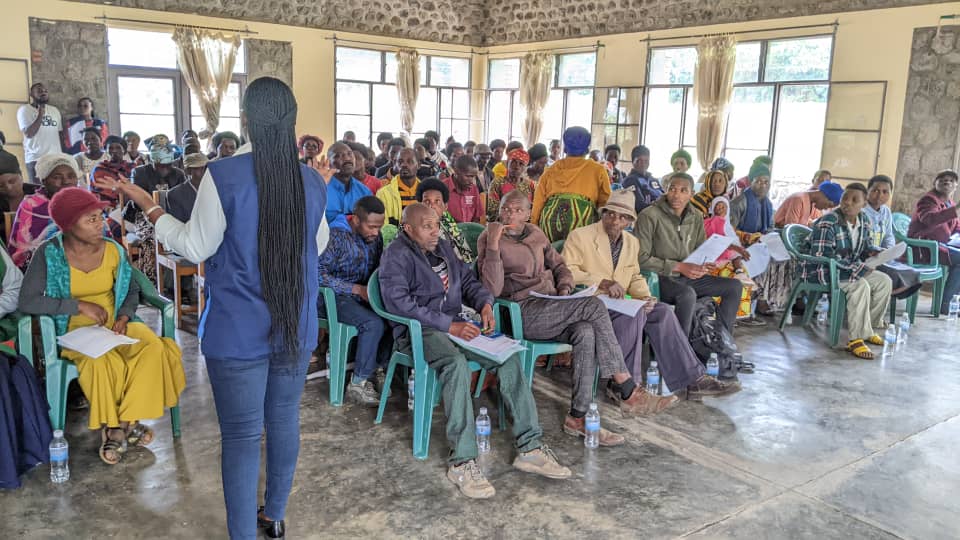AWF and INKOMOKO Partner to Boost Local Economies Near Rwanda’s Volcanoes National Park

Community members at the business incubation program
Over 100 entrepreneurs living near Volcanoes National Park (VNP) in Rwanda will benefit from a new business incubation program launched by the African Wildlife Foundation (AWF) in partnership with INKOMOKO. This initiative is designed to protect the park's ecosystems while enhancing local livelihoods by supporting communities in transitioning to climate-resilient, conservation-friendly enterprises.
The program's first cohort recently participated in a workshop focused on business plan development, providing them with essential skills for success. Patrick Nsabimana, AWF's Acting Rwanda Country Director, emphasized that the program offers comprehensive support, including training, mentoring, start-up funding, and infrastructure access. “By fostering local ownership and building resilience, AWF is creating a win-win scenario for both wildlife and communities,” he said.
Conservation Efforts at Volcanoes National Park
Located in northwest Rwanda, Volcanoes National Park is home to endangered mountain gorillas and other rare wildlife. Thanks to ongoing conservation efforts, the mountain gorilla population has increased from 400 in the 1990s to 1,004 across Rwanda, Uganda, and the Democratic Republic of Congo (DRC). However, these gorillas continue to face significant threats from habitat fragmentation and loss.
To address these challenges, the Rwandan government has initiated plans to expand the park's boundaries by 23%, a move that will engage approximately 600 households currently residing in the area. This expansion is vital for enhancing the park's conservation efforts and biodiversity while also supporting the surrounding communities.
Empowering Local Communities
To aid the communities affected by the park's expansion, AWF and INKOMOKO are dedicated to improving economic opportunities through sustainable development following our rights-based approach that is focused on Free Prior and Informed Consent. The business incubation program is designed to catalyze the creation of sustainable enterprises and generate employment for those impacted by the expansion.
The program focuses on sectors such as sustainable agriculture, handicrafts, and nature tourism, with the goal of establishing micro, small, and medium enterprises (MSMEs) that reduce reliance on climate-vulnerable livelihoods and alleviate pressure on protected areas. Priority is being given to business ideas that promote the sustainable use of natural resources and encourage local ownership of conservation goals.
Under this initiative, at least 50% of participants are women, who have historically had limited access to economic opportunities. The program also emphasizes the inclusion of youth and members of disadvantaged groups.
From Ideas to Thriving Enterprises
Entrepreneurs from communities affected by the VNP expansion have been invited to submit their business ideas through an open call. These ideas will be evaluated based on criteria such as viability, job creation potential, sustainability, and conservation impact. A selection committee comprising representatives from the government, private sector, and NGOs will choose the final cohort of 50 entrepreneurs.
Shortlisted candidates will undergo specialized training in business plan development during a one-week intensive workshop. During this workshop, they will refine their business concepts with the support of facilitators and mentors.
Thereafter, the incubation phase will equip entrepreneurs with the necessary skills and resources to succeed. Workshops on financial literacy, marketing, operations, and human resources will be complemented by personalized mentorship. Participants will also gain access to finance through connections with microfinance institutions and impact investors, as well as networking opportunities and exposure visits to foster peer learning and partnerships.
After six months, enterprises demonstrating investment readiness will graduate from the program. They will continue to receive continued support in the form of market linkages, access to technical resources, and ongoing monitoring to ensure their long-term success.
Collaborative Efforts for Sustainable Impact
This business incubation program marks a significant step in aligning conservation efforts with community development. By partnering with local entrepreneurs, the initiative helps secure the future of Rwanda's wildlife while promoting sustainable growth and improved livelihoods for communities near Volcanoes National Park.
As part of this innovative program, AWF recently organized a study tour for 20 aspiring entrepreneurs at the 17th Rwanda National Agriculture Show in Kigali. The visit provided participants with a unique opportunity to explore cutting-edge agricultural technologies and sustainable practices that could inform their business concepts.